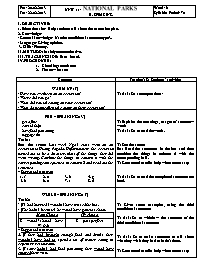Giáo án English 10 - Unit 11: National Parks - B.Speaking - Năm học 2012-2013

I. OBJECTIVES:
1. Education aim: Help students talk about the excursion plan.
2. Knowledge:
- General knowledge: Use the conditional sentence type 3.
- Language: Giving opinion.
3. Skills: Fluency.
II. METHOD: Mainly communicative.
III. TEACHING AIDS: Extra board.
IV. PROCEDURE:
1. Checking attendance
2. The new lesson
Bạn đang xem tài liệu "Giáo án English 10 - Unit 11: National Parks - B.Speaking - Năm học 2012-2013", để tải tài liệu gốc về máy bạn click vào nút DOWNLOAD ở trên
Pre : 20.02.2013 Tea: 22.02.2013 UNIT 11: NATIONAL PARKS B. SPEAKING Week: 6 Syllable Period: 70 I. OBJECTIVES: 1. Education aim: Help students talk about the excursion plan. 2. Knowledge: - General knowledge: Use the conditional sentence type 3. - Language: Giving opinion. 3. Skills: Fluency. II. METHOD: Mainly communicative. III. TEACHING AIDS: Extra board. IV. PROCEDURE: Checking attendance The new lesson Contents Teacher’s & Students’ activities WARM UP (5’) - Have you ever been on an excursion? - Where did you go? - What did you take along on your excursion? - What do people often take along on their excursion? T: Asks Sts some questions: PRE – SPEAKING (13’) + get a fine: + carsick (adj) + have food poisoning + luggage (n) Task 1: Sets the scene: Last week Nga’s class went on an excursion to Huong Pagoda. Unfortunately, the excursion turned out to be a disaster. Most of the things they did went wrong. Combine the things in column A with the corresponding consequences in column B and read out the sentences * Suggested Answers 1. f 2. c 3. h 4. g 5. b 6. c 7. a 8. d T: Explains the meanings, usages of some new words T: Asks Sts to read the words. T: Sets the scene Sts: Read the sentences in the box and then combine the things in column A with the corresponding in B. T: Goes round to offer help when necessary. T: Asks Sts to read the completed sentences out loud. WHILE – SPEAKING (15’) Task 2: If I had hurried, I wouldn’t have missed the bus. If he hadn’t been sick, he would have gone to school. Main Clause If – clause S + would / should + have + V3 (ed) S + past perfect * Suggested Answers 2. If they had brought enough food and drinks, they wouldn’t have had to spend a lot of money eating in expensive restaurants. 3. If some hadn’t had food poisoning, they would have enjoyed their visit. 4. If they had had raincoats, they wouldn’t have got wet and some wouldn’t have had a cold. 5. If some hadn’t left their luggage on the coach when they arrived, they would have had their clothes and money with them. 6. If some had been more careful when walking in Huong Pagoda, they wouldn’t have got lost 7. If some hadn’t thrown waste in the forest, they wouldn’t have got a fine. 8. If they hadn’t stayed there only one day, they could have visited all the pagodas. T: Gives some examples, using the third conditional sentences T: Asks Sts to withdraw the structure of the third conditional sentence T: Asks Sts to make sentences to talk about what they wish they had or hadn’t done. T: Goes round to offer help when necessary. T: Calls some Sts to read out their sentences in turns. POST – SPEAKING (10’) Task 3: Express regrets about what you did or did not do in the past Instruction: You are going to work in pairs. One of you is Nga and the other is one of Nga's friends. Ask and answer about the excursion to Huong Pagoda and express your regrets about what you did or did not do during the excursion. Nga's friend Nga (you) Ask what Nga did last Saturday - Ask about the means of transport Nga's class used to go to Huong Pagoda - Ask about food and drinks Nga's class brought. - Ask about the duration of the excursion. - Ask what they did in Huong pagoda - End up the conversation Answer the friend's question (I went to Huong Pagoda with my class) - Answer and express regrets. - Answer and express regrets. - Answer and express regrets - Tell what they did and express regrets + T: Last Saturday, I phoned you but you weren't at home. Your dad said that you were going on an excursion. Where did you go? + Y: I went to Huong Pagoda with my class. + T: Really? Was that fun? + Y: Not really. + T: Why so? + Y: Most of the things we did went wrong. + T: Tell me, how did you go there? T: Asks some Sts to speak out what they have discussed. Ss: Answer T: Corrects mistakes if necessary. Asks Ss to work in pairs and gives each pair 2 handouts: one for Nga and the other for Nga's friend. - Goes around observing and collecting errors. - When most pairs finish, T calls on some pairs to act out their conversation. - Asks some Ss to comment. - Writes some typical errors on the board and asks for self and peer correction. T gives correction only when other Ss cannot correct the errors. HOMEWORK (2’) T: Asks Sts to write some regrets about what they did or did not do. * Comments & supplement:
Tài liệu đính kèm:
 B.doc
B.doc





